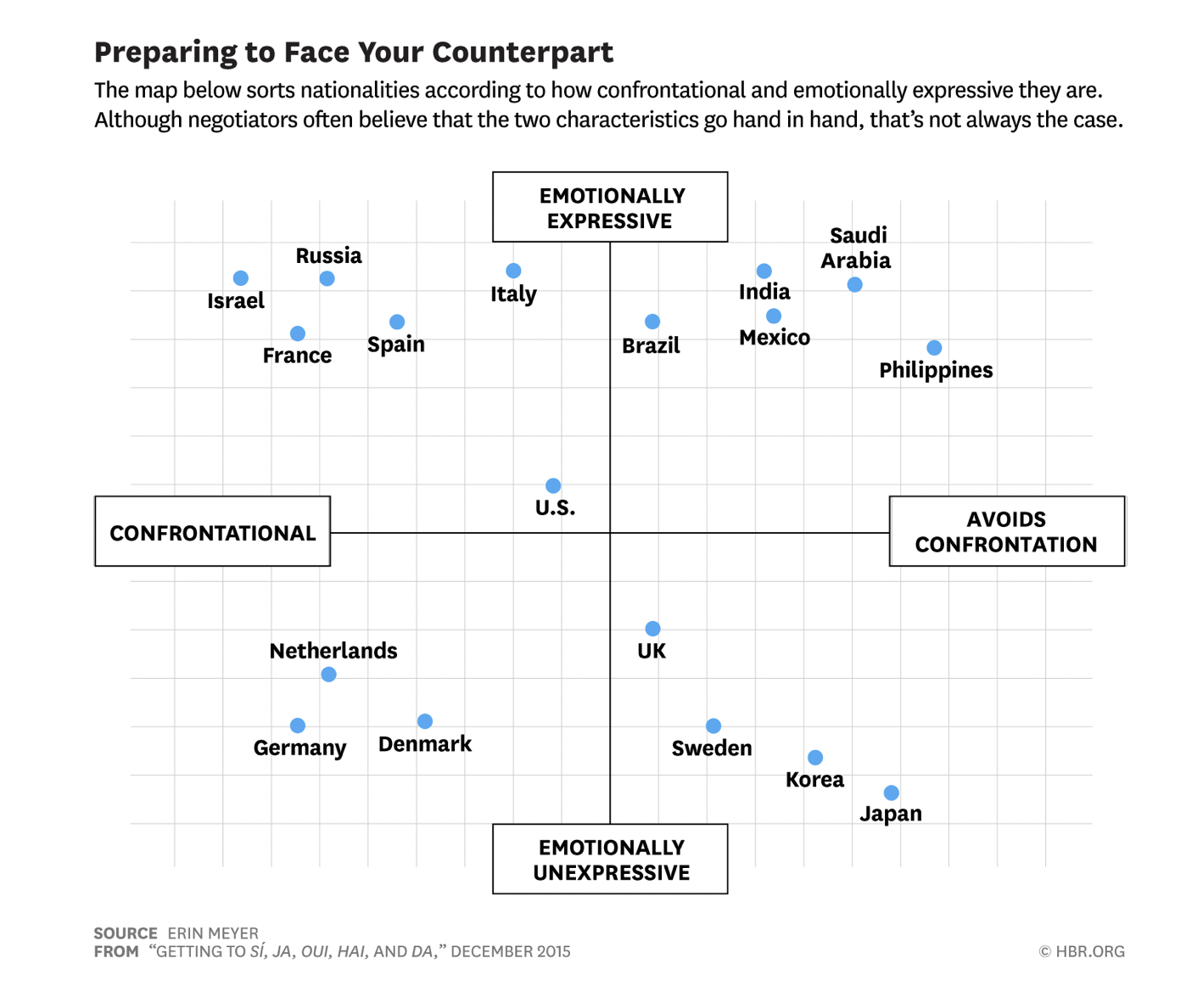If you're planning to hire virtual assistants from the Philippines, take your time to learn about these cultural differences so they don’t catch you off-guard — and potentially cause an awkward pause on your next Zoom meeting.
Here’s what you need to know about the Philippines’ business culture and how it’s different from the US:
Don’t expect them to be too straightforward
Most Americans appreciate direct communication. They say what they mean and cut straight to the chase. Filipinos? Not so much.
When you hire Filipino EAs or VAs, keep in mind that they may:
- Hesitate to say their real opinions when you ask them for feedback
- Use non-committal responses like “We’ll see” or “I’ll do my best” when they actually mean “no”
- Take the scenic route when explaining an issue
- Find directness uncomfortable, rude, or even impolite
This is because the Philippines — like most Asian countries — has a high-context culture.
In high-context cultures, communication is super nuanced.
Factors like body language, tone, facial expressions, and even the status of the person all play a part in the conversation. In this setting, there’s no need to explicitly verbalize your message. Instead, people rely on non-verbal cues and context to communicate.
If you’re from a low-context culture like the US where spelling things out is the norm, you might find this communication style confusing. You might miss your Filipino VA’s non-verbal cues or come across as too assertive when giving direct feedback.
How do you bridge the gap?
Understanding the context behind these different communication styles is already a step in the right direction. This is especially important to consider when you hire from the Philippines for roles requiring collaborative work. Here’s how you can take it up a notch:
Watch out for subtle cues
this is tricky if your only communication channel is through Zoom or chat, but try to catch your assistant’s non-verbal cues. Watch out for long pauses, a non-committal “yes”, their tone of voice, or body language. Even emojis can have different meanings across cultures, so try to be aware of that.
Encourage open communication
Let your Filipino team know that it’s okay to give their honest opinion on things. Encourage them to ask questions, welcome their inputs, and foster an environment that values honesty.
Build a genuine relationship
Filipino VAs may come off as shy, but they are intuitive. Once they get your preferred communication style, they’ll do their best to match it — even if it means going out of their comfort zones. Create rapport and build a genuine relationship so that they can learn how to communicate effectively with you.
Confrontation? No, thanks.

Like most collectivist cultures, Filipino society values harmony among each other. The welfare of the group comes first before the self, and they’d go the extra mile to keep things peaceful.
Open disagreement, lively debates, criticizing someone’s work, and voicing strong opinions are not their cup of tea. While a typical Westerner might see these situations as an opportunity to address an issue efficiently, Filipinos will see these as a sign of conflict.
They would rather:
- Express their thoughts in a more diplomatic way
- Use subtle cues to express their dislike
- Initially agree then pushback later — usually through an indirect channel like email or chat
- Ask a senior team member to mediate for them
You might find these methods inefficient, but for your Filipino VA, it’s their way of keeping harmony within the team. In order to function effectively, you’ll need to meet in the middle.
Here’s what you can do
Be discreet about giving negative feedback
Avoid calling your Filipino staff out in front of everybody. Aside from being conflict-averse, the concept of “saving face” is also important in Filipino culture. Instead, give constructive criticism during a 1:1 meeting or on private chat.
Phrase it as a question
Instead of giving direct commands, try asking questions like “How can we improve this?”, “What do you think is the best course of action?”, or “Can you get this done by this week?”
Create anonymous surveys and feedback forms
This is a great way to get feedback from team members who don’t feel confident about expressing their ideas in front of groups.
For Filipinos
Don’t take things personally
Direct criticism, especially the constructive kind, isn’t meant to be an affront to you as a person. Your employer is not trying to question your skills, experience, or authority. It’s simply feedback on your work. Be objective and use this as an opportunity to improve.
It’s okay to speak up
Don’t be afraid to voice your opinion and offer your insights. Think the deadline’s too tight? Let them know and offer more realistic alternatives. Got a more efficient way to tackle a problem? Present it as an option. Your team will appreciate your initiative.
Make sure you’re on the same page
Avoid skirting around issues. Ask questions and repeat info back to your employer to make sure that you’re both on the same page. This will help you set clear expectations.
Titles and honorifics
.jpeg)
Americans wouldn’t think twice about calling their boss by their first name. In the Philippines, doing that to your Filipino boss would get you in a lot of trouble.
Hierarchy is a big thing in the country, and using honorifics is a huge part of that culture.
Younger folks, for example, are taught to use titles like kuya (elder brother) or ate (elder sister) to address older members of society, regardless if they’re actually related.
This culture gets carried over into the professional setting. Subordinates are expected to address their superiors by their professional titles or use terms like “ma’am”, “miss”, and “sir” as a sign of respect.
What to expect
Your VA might call you “ma’am” or “sir” at first.
Don’t be overwhelmed. Just let them know that it’s okay to call you by your first name. It might take them a while, but they’ll get used to it.
Expect nicknames among your Filipino staff
Older team members could be given the title ate or kuya. If you’ve got Filipino team leaders or operations managers, expect them to be addressed as “TL” or “OM” among their Filipino colleagues.
They celebrate more holidays
.jpeg)
Filipinos celebrate a lot of holidays — around 18 each year. In contrast, Americans only take time off for 8 holidays at most.
The Christmas season is an especially festive time for Filipinos.
Holiday decorations start popping up as early as September. On Christmas Eve, Filipinos stay up until midnight for Noche Buena — a party full of fun games, gifts, and lots of food. These celebrations continue until the end of the year.
Another big event — albeit a more somber one — is Lent or Holy Week.
80% of Filipinos are Catholics, and they observe Lent in a series of religious activities that start from Maundy Thursday and conclude on Easter Sunday.
When you hire from the Philippines, recognizing their cultural traditions and holidays shows respect and helps build a strong relationship. Being familiar with these holidays allows you to understand your team and plan your schedule better.
Here are some things to consider
Will your team follow US or Philippine holidays?
Early in the hiring process, figure out if your team should follow local holidays or take time off during US holidays. This will allow your VA to plan their tasks and times off accordingly.
Task endorsement
Knowing what holidays to follow helps you plan for your team’s leaves in advance. It will also help your team cook up leave guidelines and an endorsement process to make sure that no one drops the ball, even when they’re out on leave.
13th-month pay
Employees in the Philippines typically receive a Christmas bonus called the “13th-month pay”. It’s not required if you’re hiring them as independent contractors, but you can definitely use it as an incentive to retain team members.
Team engagement
Are you able to accommodate engagement activities like Christmas parties or company outings on special holidays? Like the 13th month pay, doing this isn’t required, but it will help boost your team’s morale and improve employee retention.
They're family-oriented
.jpeg)
Family plays a vital part in Filipino society. Whereas Western cultures promote independence and mobility, collectivist cultures like the Philippines value stability and community.
For example, in the US, children are expected to move out of their parent’s house when they hit 18. In the Philippines, it’s not uncommon for grown children to stay with their families, even after marriage.
Instead of “leaving the nest” and forming family units of their own, most Filipino families just merge together into one big clan.
They often live in close proximity to each other, too. Some of your Filipino team members might be living in multigenerational households.
How does this affect your business?
The truth is it doesn’t. But knowing this will help you understand your Filipino team members better. Here’s how:
Work is a way to provide for their families
Most folks see work as a way to advance their professional and personal growth. The same is true for a lot of Filipinos, but there’s an added layer to it: work is also a way for them to provide for their families. They may seek career advancement to support aging parents, their siblings’ education, or help with family expenses.
They’ll likely ask about your family, too
No, they’re not being nosy. They simply want to get to know you. For lots of Filipinos, family is a neutral conversation topic — like the weather or last night’s ball game. Expect them to ask about your family or share details of their own every once in a while.
“Work” family
Many Filipinos treat work as their second family. This can have both positive and negative implications. On one hand, they’re able to build strong social bonds with co-workers and remain loyal to your organization. On the other hand, they might need to work extra hard on establishing healthy boundaries between work and their personal lives.
Warmer work relationships
.jpeg)
Pakikisama — or getting along well with others — is a common trait you’d often find in your Pinoy team. Putting a premium on camaraderie means they’re able to work together as a tight-knit unit, sharing common goals and motivations.
It also means building strong social bonds with their co-workers. Meetings, for example, usually begin with greetings and small talk.
In a physical office setting, you’d often find Filipino employees:
- taking lunch and coffee breaks together
- holding potlucks to celebrate special occasions
- going for a karaoke session after shift —
- — and planning out-of-town trips for fun
Filipino teams thrive well in an environment that allows them to build meaningful relationships with their co-workers. Remote work can make this challenging, but it’s not impossible either.
Here are super simple ways to keep your remote team engaged
- Give new team members a warm welcome - a fun onboarding call can make a great first impression on new team members
- Plan fun virtual activities - regularly schedule team activities like games, trivia nights, virtual happy hours, and other team-building activities.
- Celebrate with them - greet your team members on special occasions like their birthdays or work anniversaries
- Create a watercooler channel or group chat - think of this as a virtual break room where your team can share nonwork-related stuff like pictures of their pets, memes, or favorite TV shows
- Say hi - team engagement doesn't have to be fancy. Simply checking in and asking your team about their day can already make a huge difference
- Develop talent - building company culture goes beyond free pizza and game nights. You also have to provide opportunities for professional growth and development. Give access to courses, books, and other resources to foster continuous growth
- Plan in-person meetups - If you can, see each other in person at least once a year.
“Filipinisms”
.jpeg)
Filipinos are awesome English speakers. But like other English-speaking countries, they use regional words or phrases that are slightly different from American English. These words or phrases are called “Filipinisms”.
Here are some common examples:
- “CR” - restroom
- “Rubber shoes” - sneakers
- “Soft drinks” - any type of soda or carbonated drink
- “Ref” - fridge
- “Filling up” forms and documents instead of filling them out
- “Opening and closing” the lights instead of turning them on or off
- Asking you to “wait for awhile” when they mean “hold on for a minute”
- Saying “next next week” instead of “week after next”
How this affects work
Filipinisms can sound strange to American English speakers. If you’ve got Filipino teams handling customer-facing channels like chat or email support, customer service, sales, content, and social media, make sure that they use American English to avoid any confusion or misunderstanding.
Other cool things you probably didn't know

They’re influenced by Asian, Hispanic, and Western cultures
Like the US, the Philippines is a multicultural nation. Due to factors like trade, colonization, and labor migration, they’ve become a melting pot of Asian, Hispanic, and American influences.
Speaking at least two languages? Totally normal
Most Filipinos are bilingual by nature — they're fluent in Tagalog and English. If your remote assistant is from a region outside of Luzon, they likely know how to speak one or two more languages.
Filipinos spend a lot of time on the internet
Stats show that the average Filipino spends at least 10 hours online. The same report shows that Filipinos are the world’s second-largest social media users.
Food plays a huge part of their culture
"Have you eaten already?" is the Filipino equivalent of saying "How are you?"
When you see a Pinoy eating lunch or snacks in the office, expect them to offer to share it with you as a sign of politeness. (Heads up: it’s completely fine to turn this offer down)
A smaller gender gap
Compared to the States, the disparity between men and women in the workplace is slimmer in the Philippines. In fact, the Philippines ranks 19th in the World Economic Forum’s Global Gender Gap report, while the US fell behind at 27th place.
It's not uncommon for women to hold positions of power and influence at work, in government, and society in general.
Why learning about Filipino work culture is important

It helps you understand your team better
Remote Filipino employees work well with American companies because they understand Western culture. This goes both ways. By being familiar with the nuances of Filipino work culture, you understand your team — and work with them — better.
Knowing their values, traditions, and common goals allows you to meet in the middle and create work processes that make sense for your business.
It boosts employee productivity, engagement, and retention
Creating a work environment that's aligned with your team's values keeps them engaged. They'll contribute more to the company, strive to produce excellent results, and ultimately stick with you for a long time.
It prevents misunderstandings
As we discussed above, Eastern and Western communication styles are wildly different. Learning about Filipino work culture helps bridge the gap and allows you to communicate clearly without any room for misinterpretation or misunderstanding.
You can delegate more tasks
Clear communication and aligned team members — it’s the perfect combo for a smooth delegation process. Understanding your team ultimately helps you outsource tasks effectively. You’ll be able to take your time back and do more.
Build a stronger remote team by understanding Filipino work culture
Yes, Filipinos share a lot of similarities with the US — they watch the same TV shows, listen to the same songs, and even tune in to Western current events.
But they also have a work culture that's entirely their own. Create a strong remote team — and get more things done — by understanding Filipino work culture.

.jpeg)












